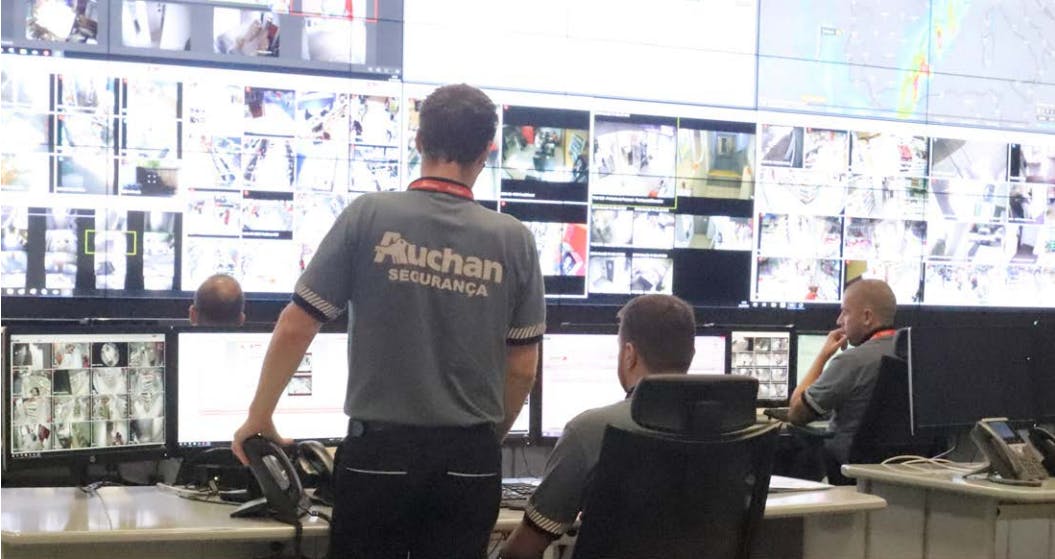
Retailers use of Security Operations Centres is EXPANDING
In our recent video working group session, we explored the evolving use and role of Security Operation Centres (SOCs) in the retail sector, which based on a benchmark survey of 49 retailers ahead of the meeting, suggests that over 81% of retailers have at least one SOC.
One of the most cited benefits of being able to remotely view stores is the significantly reduced # of false positives from alarm systems, a common challenge in retail security. This reduction not only saves time and resources but also strengthens the credibility of genuine alarms, leading to quicker and more effective police responses.
The conversation also touched upon the innovative uses of SOCs beyond just the remote monitoring of cameras, with panic alarms, EPOS sales data, weather, social media, and refrigeration data as examples of the new data streams being accessed. .
The discussion also reflected on a current debate on whether SOCs should be managed in-house or outsourced. Concerns around data sharing and privacy in the context of third-party management were highlighted, reflecting the industry's growing focus on data security.
The session concluded with a forward-looking perspective, suggesting a shift from traditional security-focused operations to more holistic 'retail operation centres' or 'business support centres' will be the next major trend in the evolution of the SOC.
You can read the full transcript of our discussion below. And sign up for our next meeting “Future thinking on video” on 5 December here.
Transcript [edited for brevity]
Colin Peacock: Last week, as part of our series on video and our video working group, we discussed the evolving role of security operation centres in retail. Retailers are increasingly bringing together capabilities to remotely monitor their stores and other assets. We had around 42 retailers join the call and some excellent presentations. What were your key takeaways from these presentations and the subsequent discussion?
Adrian Beck: Indeed, it was a fruitful discussion. One retailer, who has significantly invested in their Security Operation Centre (SOC), gave an impressive presentation. We're seeing the major benefits of digital video systems, particularly in their remote accessibility, which opens up a range of opportunities for centralised resource management. A core use case for these systems, especially in the beginning, is monitoring alarms to address the high rate of false positives. This scepticism towards alarm systems has led retailers to employ third parties for monitoring. However, the ability to remotely view stores via video systems has dramatically reduced false positives.
Colin Peacock: It's transformative, isn't it? Keyholders no longer need to respond to false alarms at inconvenient hours.
Adrian Beck: Exactly. The reduction in false positives has not only benefited retail staff but also bolstered police confidence in the veracity of alarms. This has led to quicker and more reliable police responses. The return on investment here is quite impressive. Another key learning was how retailers are expanding these capabilities beyond alarm monitoring.
We heard how systems are being used for internal theft investigations and linking with other data sources, like E-POS data, to enhance system capabilities. Another interesting use of the video was in terms of health and safety issues, like monitoring slips and falls, and in making informed decisions about legal cases.
We're also seeing these systems used for non-security purposes, such as checking compliance with promotional displays or preparing for stock audits. Instead of getting on the train or getting in the car, you can actually dial it up via your central SOC and begin to see how stores are performing around these issues.
Colin Peacock: The range of imaginative uses for these systems seems endless. It's all about how creatively we can use the data.
Adrian Beck: Absolutely. The discussion also touched on whether these security centres should be staffed by retailer employees or outsourced to third parties. This debate extends to concerns about sharing sensitive data, like E-POS data, with third parties, especially considering recent data breaches.
Colin Peacock: This topic definitely merits further discussion. In our survey of about 50 retailers, over 80% now have security operation centres. The next debate might be around what we should call these centres – perhaps moving from "security operation centres" to "retail operation centres" or "business support centres".
Adrian Beck: Business support centres, indeed.
Colin Peacock: Our next video working group meeting is on December 5th. It's an opportunity to engage with CEOs about the future of retail and how to future-proof their operations. I think there should be a QR code appearing somewhere on the screen. Thank you, Adrian, for your insights. Looking forward to our next meeting.
Adrian Beck: Thanks, Colin. See you next time.
Nov 6, 2023
Main office
ECR Community a.s.b.l
Upcoming Meetings
Join Our Mailing List
Subscribe© 2023 ECR Retails Loss. All Rights Reserved|Privacy Policy
